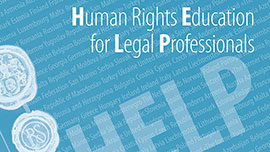Speech by Mikhail Lobov
Superior Courts Network Focal Points Forum
6-7 June 2019
Seminar Room, European Court of Human Rights, Strasbourg
Speech delivered by Mikhail Lobov, Head of Human Rights Policy and
Co-operation Department, Directorate General Human Rights and Rule of Law (DGI), Council of Europe
European Court of Human Rights, Strasbourg 6 June 2019
Dear President of the Court,
Honourable judges,
Distinguished representatives of European superior courts,
Dear colleagues,
It is a great honour and pleasure to be associated with the Superior Courts Network (SCN) Forum for a third consecutive year. I am happy to see the SCN growing every year and also to see in this room our national partners from numerous member States with whom we are in touch on a regular basis in our co-operation programmes.
Indeed, the SCN and Council of Europe (CoE) co-operation programmes pursue the same overarching goal, that is the effective national implementation of the Convention, which remains a big challenge for the Convention system as a whole. Unsurprisingly, last year's Copenhagen Declaration put an emphasis on time, and again on the national implementation, and called for further action to that effect.
Hence, we are trying by all means to enhance our co-operation with the national authorities, and the national judiciaries in the first place. Convention-related knowledge sharing is key to the success of any co-operation programme conducted by this department. It does not only apply to bilateral co-operation projects we conduct with many of your jurisdictions. Indeed, lawyers and judges of the Court and colleagues of the Department for the execution of the Court's judgments intervene as central and indispensable actors in such programmes. Knowledge sharing is also at the heart of the CoE HELP Programme which increasingly shapes human rights education in Europe. Our co-operation with the Court in HELP Programme is also increasing, and I would like to thank you, Mr President, for accepting to be a keynote speaker in the forthcoming HELP annual Conference in a few weeks.
You will hear more about the concept, contents and achievements of HELP Programme tomorrow morning from my colleague Eva Pastrana, Head of the HELP Unit. We are grateful to the organisers for giving us an opportunity to present HELP courses, which, I hope, will be interesting and useful.
For my part, let me say a few words about the way ahead as the Committee of Ministers prepares a final stocktaking of the Interlaken process. You will remember that the Interlaken declaration set by the end of 2019 a time-limit to decide whether a further reform, not excluding a major reform, of the Convention system would be necessary. Accordingly, the Steering Committee for Human Rights (CDDH) is now recollecting everything that has been done since 2010 in order to increase the effectiveness of the Convention system.
You will not be surprised that the CM is quite unlikely to engage in a new reform at this point of time but would rather encourage all Convention actors to consolidate the achievements of the recent years.
And one of the major gaps that remains to be bridged is, again, the national implementation of the Convention and Court's judgments.
In this regard, it will not be an overstatement to say that the Court's knowledge sharing system may become a genuine breakthrough in the Convention system's further development.
Indeed, the main bulk of cases coming to Strasbourg, - and there are still some 60 000, which is at any rate quite an impressive number, - arise from insufficient convention-related knowledge and skills at the national level, and quite often still within national courts.
For having worked in the Court for years, it seems to me that the knowledge sharing concept has already streamlined and improved the consistency of the case processing within the Court itself. But the ambition, as I understand, is much higher than that. Indeed, if all the knowledge accumulated in Europe on the Convention could be effectively transmitted and anchored within European courts at large - this would no doubt be the best service one could pay to the principle of subsidiarity. And this is what would make subsidiarity work much better in the day-to-day practice.
We are fully aware that making the Convention-knowledge sharing a Europe-wide exercise is an endeavour which will require tremendous resources. If one could only think about the wealth of material to be translated! And yet, the translation should only be a first step to make the knowledge fully accessible to national judges at the European scale.
Needless to say, for the moment both the Court, and our Directorate General have rather limited resources at our disposal. But we are reflecting with our Registry's colleagues on how the CoE could better assist in this process to make it happen. And I am convinced that we will slowly but surely go into this direction so as to help national judges benefit fully from what I would call a goldmine of Convention-related know-how that has been accumulated during 60 years of its existence.
And I would like to congratulate my colleagues from the Court for kicking off this extremely important exercise at today's Forum, which the Directorate General Human Rights and Rule of Law has a great privilege to support.
My colleagues and I are looking forward to continuing our exciting collaboration with you all and look forward to the launch of the so much needed knowledge sharing platform this morning.
Thank you!




